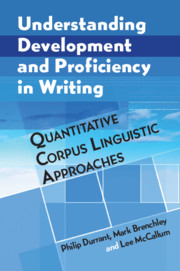Book contents
- Understanding Development and Proficiency in Writing
- Understanding Development and Proficiency in Writing
- Copyright page
- Contents
- Figures
- Tables
- Acknowledgements
- 1 Introduction
- 2 Theoretical and Methodological Foundations
- 3 Development in Syntax
- 4 Development in Vocabulary
- 5 Development in Formulaic Language
- 6 Development in Cohesion
- 7 Conclusions
- References
- Index
3 - Development in Syntax
Published online by Cambridge University Press: 26 February 2021
- Understanding Development and Proficiency in Writing
- Understanding Development and Proficiency in Writing
- Copyright page
- Contents
- Figures
- Tables
- Acknowledgements
- 1 Introduction
- 2 Theoretical and Methodological Foundations
- 3 Development in Syntax
- 4 Development in Vocabulary
- 5 Development in Formulaic Language
- 6 Development in Cohesion
- 7 Conclusions
- References
- Index
Summary
This chapter reviews the quantitative corpus linguistic literature on syntactic development in first- and second-language writing. It first provides a theoretical and methodological context for such work by discussing the construct of syntactic proficiency. It then critically reviews an extensive body of literature to establish what substantive conclusions can be drawn and how future research could most productively develop. The strongest developmental patterns are found for generic measures of syntactic complexity, as operationalised through measures such as mean length of sentence/T-unit/clause and subordinate clause ratios. However, we argue that such measures are relatively uninformative with regard to a detailed understanding of development. Our review of more specific syntactic measures highlights a number of key features which have the potential to give useful insights into language development, while also underscoring the fragmentary nature of the measures studied to date. Methodologically, the review identifies a pervasive lack of conceptual clarity regarding what is measured and why. We find important unacknowledged differences in how key terms (e.g. clause, noun phrase) are defined and operationalised, which make it difficult to build a theoretically meaningful and cohesive developmental picture.
Keywords
- Type
- Chapter
- Information
- Understanding Development and Proficiency in WritingQuantitative Corpus Linguistic Approaches, pp. 56 - 116Publisher: Cambridge University PressPrint publication year: 2021



